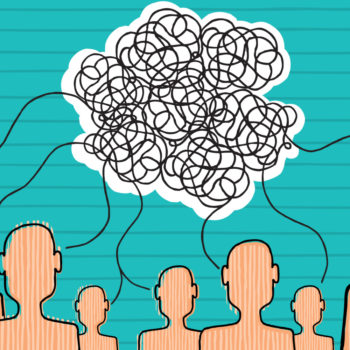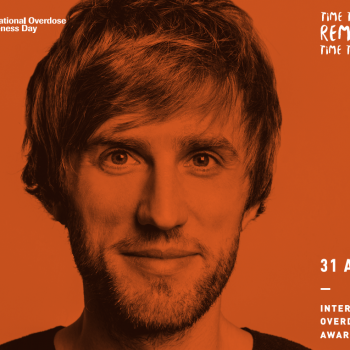Understanding Displacement While Grieving
/ For Funeral Professionals : Eleanor Haley
For further articles on these topics:
Grief is complex. I think we all can agree on this. Grief twists, turns, changes, and evolves. A number of factors influence how a person experiences and copes with grief: interpersonal, psychological, logistical, physical, spiritual, behavioral and many other facets of a person's life.
Needless to say, it takes a lot of effort to try and understand the many different experiences related to grief. However, whether you are a professional working with someone grieving, a person supporting a friend or family member in grief, or if you are grieving yourself, learning more about grief is really important. Sometimes it is enough to be compassionate (and self-compassionate) but, there are so many misconceptions about grief, often that isn't enough.
What is displacement?
Displacement is what Sigmund Freud (yeah, we're travellin' back a ways) described as a 'defense mechanism'. Defense mechanisms are behaviors that people use to protect themselves from unpleasant internal conflicts, thoughts, and emotions.
Defense mechanisms are tricky because they happen on an unconscious level, so people usually don't know they're using them. By doing so, they protect themselves from having to acknowledge, experience, admit, or cope with the emotion that is causing them unconscious anxiety. Displacement is just one of many defense mechanisms. Other defense mechanisms like denial, repression, and projection can impact grief, but today we want to focus specifically on displacement.
Displacement is when a person has unpleasant thoughts or emotions towards someone, but instead of taking these emotions out on the original source, they take them out on another person or object. Displacement can happen when a person is unable to express their emotions towards the source that is causing that emotion. This could be because it would have negative consequences. It could be because they don't actually know what is causing emotion (sometimes it is harder to know what is bringing up feelings than you'd imagine!). And sometimes it is because the source isn't an actual person (like, say, cancer, drugs, God, the universe, etc).
Here's an example of displacement...
Mary's boss has been yelling at her all day. She thinks her boss is being unfair and overly harsh, which makes her feel angry and frustrated. Unfortunately, Mary's boss is a hot-head and she knows if she responds or confronts him that he will fire her. Mary is relieved when quitting time comes but continues to feel a little on edge.
When Mary walks through the front door at home she finds the house is a little untidy. Normally Mary wouldn't mind the mess, but on this day she calls her son downstairs and lays into him. Afterward, Mary feels ashamed at how hard she was on her son. Since Mary is an enlightened soul, she spends some time in self-reflection. She eventually realizes she displaced the anger she felt towards her boss onto her son.
How does one experience displacement while grieving?

After a loved one dies, grieving people feel a number of intense and complicated emotions (duh). Sometimes you feel these things towards things like faith, illness, the world, or the person who died. For example, you may feel let down by God for allowing your loved one to die. In many of these instances, it’s impossible to express your emotions towards the actual source (i.e. the person who has died, faith, grief, etc). So, instead, you displace your emotions onto someone or something else.
Sometimes the displacement is obvious - you know exactly when and why it is happening. Other times you just find yourself being more irritable, annoyed, or angry at the people around you, even when they have done nothing wrong. It can be complicated because often your rational-brain knows that they haven't done anything, while your emotional-brain can't help but lash out.
Who do we displace on to?
Though there is no way to say who the object of displacement might be, there are some people who often take the brunt of displacement:
- People who are telling us news we don't want to hear. We're upset about the news, but we take it out on the person. If you lashed out at doctors or nurses at the hospital or hospice when your loved one died, you wouldn't be the first and you won't be the last.
- Someone in proximity but who is of a lower consequence to lash-out at. Your boss isn't being sympathetic to how hard it is to come back to work after a loss, but because you fear expressing that frustration to your boss, you take it out on a colleague or someone you manage.
- The people you love and trust most. Weird, I know! But when you're angry at the universe for taking your loved one, you may find yourself repeatedly lashing out at a parent, partner, or best friend because you know they will still love you.
Tips for Coping with Displacement
Immediately following a death, you may find your coping resources taxed by high emotion, stress, and exhaustion. You may take your anger at the situation out on the nearest person or object. So whether your grieving or supporting someone grieving, a couple of quick tips for coping:
Don't take it personally if someone is experiencing displacement while grieving
If you're supporting someone grieving, I'm sure you're a pro at staying calm and not taking things personally, it still feels bad to think you've upset, angered, or disappointed the very person you wanted to help and support. We certainly can't say that displacement accounts for any and all negative interactions. However, if a person's anger seems out of proportion or misdirected, it may help to remind yourself of the many different invisible factors, including displacement, that could be influencing the situation.
If you're grieving, cut yourself some slack. Recognizing that you've lashed out at someone who wasn't the actual object of your anger doesn't mean you're a bad person. It means grief is complicated and you did something that is very common. Being aware of it is the first step to managing it, so be kind to yourself.
Be open to apologies
If you're supporting someone grieving, there is a a chance they will catch themselves after one of these displacement moments. They'll come to you and apologize and, depending on how you're feeling or how much they've put you through, it might feel hard to accept the apology. Try to have some empathy for why this displacement event might have happened. And then try to forgive. That said, if it becomes a chronic issue it is important to have a conversation to address it.
If you're grieving, there is a good chance you've recognized at least a couple of moments of displacement while grieving. Whether it was recent or in the past, taking a few minutes to acknowledge and apologize can go a long way.
Keep an eye out in the future
If you're grieving, knowing about displacement can go a long way in anticipating and recognizing it. On especially tough grief days (holidays, anniversaries, or even just days when you know grief emotions are high) be on the lookout for moments when you might feel yourself displacing those general grief feelings onto those around you. Try to give yourself a few extra pauses before reacting and build some extra self-care in on the hardest grief days.
Subscribe down below for a free weekly grief support newsletter, straight to your inbox.
We wrote a book!
After writing online articles for What’s Your Grief
for over a decade, we finally wrote a tangible,
real-life book!
What’s Your Grief? Lists to Help you Through Any Loss is for people experiencing any type of loss. This book discusses some of the most common grief experiences and breaks down psychological concepts to help you understand your thoughts and emotions. It also shares useful coping tools, and helps the reader reflect on their unique relationship with grief and loss.
You can find What’s Your Grief? Lists to Help you Through Any Loss wherever you buy books:





Puck October 13, 2023 at 7:48 am
Thank you for your site and the information it provides. I came here googling, looking for how to deal with a close friend that is behaving poorly towards me after the loss of their partner. I want to stay connected and be a friend where I can, but I draw I line at being dealt with as the proverbial doormat.
Reading the articles helps me hold space for my friend, while trying to set boundaries, to set limits to the unreasonable behavior towards me, as well.
As I make an effort to respect their process of grieving, I mostly wish my friend could express some form of apology/acknowledgement over their behavior. Even though I’m not sure this is in the cards at this time.
Eleanor Haley October 24, 2023 at 10:17 am
Having boundaries and compassion for yourself, while also showing compassion towards a friend who is treating you poorly, but who you know is going through something very difficult, can be a delicate balance. I hope in time you two can come to a place of peace and understanding.
Miles October 8, 2022 at 2:40 pm
I had a really strange experience after my dad suicided. I felt a certain amount of “direct” grief, but then I became really sad and preoccupied about a previous romantic relationship. I ended up in a mental hospital simply because I was so confused and distressed by the situation – I had stayed in bed for days. I couldn’t understand how I was so sad and upset about an ex-girlfriend from 10 years before (to the point of almost taking my own life), and yet I was able to support my family through the funeral process and be a pillar a strength in that context. It wasn’t until a wonderful mental health nurse said that I might be experiencing “displacement” or going through the “avoidance” stage of grief that the penny started to drop. My brain was simply unable to come to terms with the suicide bereavement and attached the huge feelings of rejection and abandonment to something that perhaps felt more manageable to my overwhelmed brain. I still find romantic rejection really hard simply because it still brings up this far deeper wound. I don’t think I’ve yet processed the anger side of my feelings towards my father.
Bethany August 25, 2022 at 6:31 pm
My cousin died two weeks ago and I am spending time at his family home to help his mum and two sisters. It is heartbreaking to see my aunt try to cope with losing her son, while one of his sisters is taking all her unaddressed grief and anger out on her mother. I am sure my cousin is struggling with displacement, and directing all her anger at the loss of her brother onto her mother. I don’t want to stand by and see my aunt get treated like this but I don’t want to push my cousin away by addressing her rudeness and insensitivity. Does anyone have any advice about how to speak to someone who is suffering with displacement and upsetting those around them?
Dan Small May 21, 2021 at 10:24 pm
When my wife died last year I did not experience any displacement. Her health had been failing for a number of years. I was quite hopeful she would get better, and when she failed to improve, my fantasy continued. Medical science would produce something to save her. Nope. After her loss, for the next few months I imagined she was just in the next room, and I could never find her. I was just unwilling to accept losing her. Gradually this feeling passed, but I continued to talk to her for an additional few months, vaguely hoping for a response which never came. Now there is just the feeling of feeling lost, no goals, no dreams of a better future. I do not know how long this stage of grief will last.
Carl D May 20, 2021 at 12:34 pm
Thank you for this very compassionate and insightful article about displacement.
“Defense mechanisms are behaviors that people use to protect themselves. The article reminded me of how certain I am of the extreme degree I have used defense mechanisms to avoid remembering the childhood pain I suffered when my father himself seemed to give up feeling his feelings around his own childhood abuse, trying to control my mother’s alcoholism and maintaining order in our family structure. I was just 40 y.o. When my mother died from the complications of Alcoholism at age 67. Eleven months later my Dad died at age 66 from Parkinson’s and Kidney failure. He was a wounded soul. Since joining WYG In 2017, I have frequently wanted to communicate with my father and tell him how much I love him.
I constantly think: “When will I see you again?” I am now age 73 having put myself in psychotherapy at age 20 and continuing to this day. I am frequently moved to tears by triggers of repressed memories and the associated physical/psychological pain. I plan to re-read and write about how this article on Displacement has played out in my life. I am still grieving the lost of my parents.
Judy carr May 20, 2021 at 8:14 am
I lost my husband months ago and l don’t know we’re l am at times l am angry at him for leaving then l feel bad because l know he was very sick At these times l feel him close tome like he is in the house don’t know if l am going crazy l missing so much lam grieving terribly Tell me if this is normal
Rosie April 14, 2021 at 3:49 am
Good article thank you. Anger is such a challenging emotion to disperse or move through with out hurting ourselves or others. I lost my mother to suicide at 9 yrs old after she’d been ill for many years and made many suicide attempts. My father started dating quite soon after, and married a women just 2-3 years later. He then made a serious suicide attempt himself when I was only just 15, he never returned to the family home and my stepmother was deeply hurt. I and my siblings bore the brunt of her ‘displaced’ anger. My father emigrated 1/2 way around the world after he lost custody and our stepmother had effectively managed to stop any relationship with him when I was 18 yrs old. Now in my early 60’s I am grieving my loss of relationship with both my sisters both badly effected with ‘invisible’ or unexplained long term illness. My fathers who is in a home wasting away and my dear MIL has Alzheimer’s. My young niece of just 30 yrs died four months ago, having suffered many operations for very serious medical conditions she was born with, and slowly deteriorating in her final years. Her Dad my BIL died at just 50 yrs of cancer two and a half yrs ago.
I have thankfully been able to find and work through a lot of very complicated feelings with help from a very kind, understanding and dedicated counsellor. I recognised recently my displaced anger was hurting me, no longer internally, but often towards my dearest closest husband and grown children, and I’ve been able to say sorry. Thank you for the article.
What would you suggest to help anger? I try to journal. I find walks help me to reflect and cool, understand myself and learning to let myself cry, which hasn’t come easily, due to huge fear of going into a dark hole of depression and being ‘just like my mother’ which I was told I would be, and statistics often show ‘genetic’ links.
It’s hard to talk to anyone other than my counsellor as few understand or get how my history still affects me.
Helen April 12, 2021 at 2:23 pm
What to do on a child that’s 15 who lost his mom 3 years ago and the dad has just started dating and the child doesn’t like it . Please help I’m dating the dad and the son hates it . He feels like I’m taking his dad away from him . I see the dad once a week and we generally spend time at the house . So he knows that his dad is there . The first few months the dad said he couldn’t see me any more because he needed to be there for the 15 year old son . I said ok and that I would be here to help with anything he needed . He really wants to date and move on . Please any suggestions woluld help . Thank you .
Rosie April 14, 2021 at 4:09 am
That’s a tough one, as a ‘child’ of similar age, with having lost my Mum and when my Dad was in relationship with other women it’s one of the most painful on top of having lost your mother.
Glad you’ve recognised ‘the child doesn’t like it’, ‘and feels your taking Dad away’ – (off course), Its great you see that, try and put yourself in that position and see from child’s view what may help. Needs really good clear communication and respect. If your dating Dad your also entering a relationship with his child, it’s not going to be easy, but could be deeply rewarding with work. Hope that’s helpful.
James Robert Deane April 17, 2021 at 11:05 am
this father needs to be there for his son .not thinking of himself ,that should come later, the father took an oth when married his son needs his father now the son misses his mom nothing can compare a loss of a mom .this father needs to stop thinking of him self he understands about death the child has no idea he looks to his father for support nows not the time to bring in another mom figure into the picture ,the son is number 1 GROW UP (CHILD FATHER) because as your son gross he will think this is what you do when moms die ,they get replaced right away ,and thats not fair to the child,.!
Litsa April 17, 2021 at 1:58 pm
First and most importantly, it is important to know that people don’t “moved on” – they certainly move forward, but his son’s greatest and deepest fear is probably that his father is moving on, leaving his mother and the love and memories behind. Healthy grief is about figuring out how to keep that love and those memories with us as we move forward. People continue to grieve at new milestones and life stages – that is normal and natural, so it is very important that the whole family acknowledges this and knows that grief is not something that gets put behind you – that is what often leads to avoidance, difficulty talking about emotions, and feelings of resentment later on. What might help is knowing that his mom will always be part of your relationship – that you will get to know her through stories they both tell you. That not only are you not trying to replace her or compete with her memory, that you want to be part of keeping her memory alive. Ultimately, he and his son are probably going to need to first have some direct conversations about this and how they are each feeling, and that will hopefully create a space that you can ease back into if that is what his dad wants. Obviously no situation is the same and there are no universals, but this can be generally helpful.
Laura Moore April 12, 2021 at 8:51 am
Thank you for doing what you do, the things you share on your website have greatly helped me through this unimaginably sad time. My husband passed 10 months ago, it was very unexpected and happened in a moment. The information you shared on displacement helped me to understand or I guess I should say enlightened me. It gave me a better understanding on why situations that typically wouldn’t upset me or caused anxiety have done just that and then I feel terrible that I feel what I do or share my frustrated feelings because I don’t even understand them.